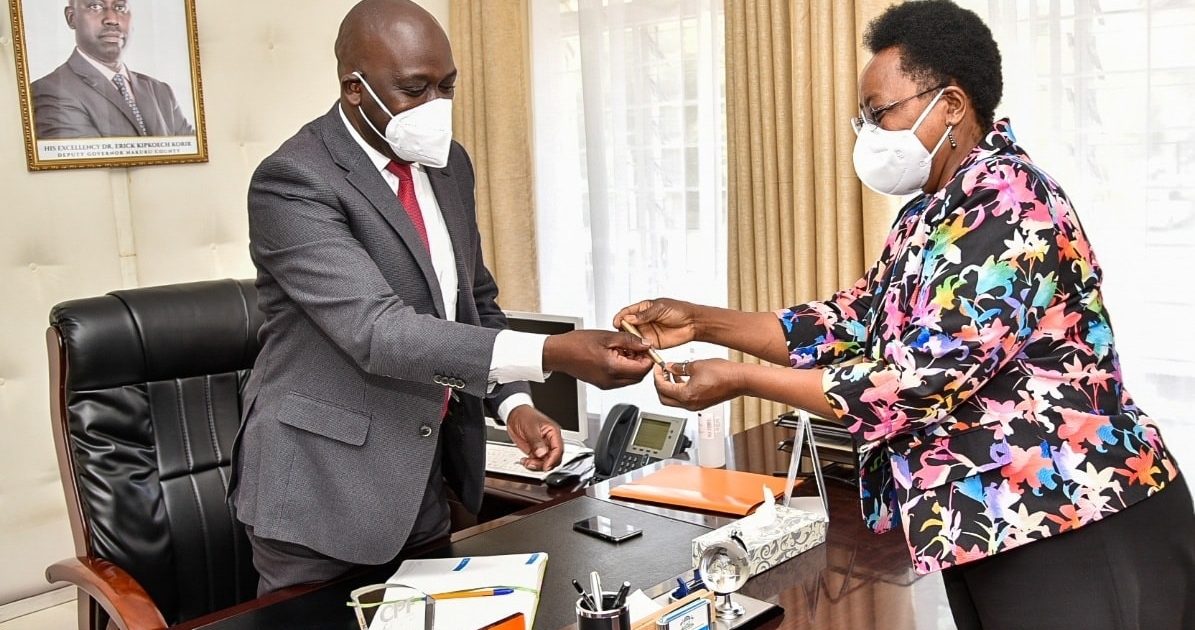Companies in Nakuru County will be compelled to have a 50 per cent women representation in their boardrooms and management structures if the County Assembly approves a new Bill.
Deputy Governor Dr. Eric Korir said the County Gender Equality and Women Empowerment Bill which last week passed the first reading at the County Assembly would obligate designated public and private entities to develop and implement plans and strategies to align their laws and policies with the new law within two years of its adoption.
Speaking in his office after holding closed door deliberations with Commissioners to the National Gender and Equality Commission (NGEC), Dr. Korir said the proposed law was crafted at promoting Gender-focused policies and programmes aimed at enabling girls and women to realize their economic potential.
“These policies include targeted investments aimed at encouraging girls to stay in school longer, so that they are empowered with the education and skills to participate in the labour force as adults,” he said.
“The Bill, if passed, will compel employing organizations to comply with the law within one year,” said the Deputy Governor.
The Deputy Governor who was accompanied by Chief of Staff Njoroge Gichuhi and County Acting Director of Gender Ms. Selina Nkatha further revealed that his administration was constructing a gender rescue and recovery centre in Gilgil Sub-County to offer free treatment and psychosocial support to victims of gender based violence.
If approved, the County Gender Equality and Women Empowerment Bill will compel public and private entities to enact and implement policies and programmes intended to protect and promote women who have been deprived by unfair discrimination and exploitation in the job market.
Gender, Children, Youth and People with Disabilities County Executive Committee Member will be furnished with strategies from all designated employers on how they planned to implement the new law.
“To ensure compliance, within a period of three years from the commencement of the Act, the entities would be required to establish a gender focal point and appoint suitable personnel at senior management level to assist the implementation of gender mainstreaming.
“However, in case of non-compliance, the executive committee member responsible for Gender, Children, Youth and People with Disabilities may use any dispute-resolution mechanism to address the stalemate,” explained the Deputy Governor.
NGEC chairperson Dr. Joyce Mutinda observed that the principle of “equal pay for equal work done and equal skills” should be reinforced by the provision of equal opportunities even in gender neutral institutions like the Public Service and the National Assembly. She noted that workplace inequality has consequences skewed against women.
“Organizations will not give what you do not ask for. As women, we have not mastered the art of negotiating our worth. Men do this effortlessly because society has taught them that they should be the breadwinners,” noted Dr. Mutinda.
“Women need to come from a point of understanding their value during negotiations. They must openly declare their accomplishments and strengths.
Sit on that table, own it, and negotiate based on your value,” she stated.
Dr. Mutinda challenged devolved units to come up with statutes that will tackle disproportions and poverty faced by women across the country.
She said girls were attending school in greater numbers than ever before, and women were increasingly entering the labour force and leading businesses.
“Unleashing the economic power of women will immensely contribute to Kenya’s growth. More so, it’s the right thing to do,” she said.
“Fortunately, policy makers and governance structures now recognize that Kenya’s economy could reach its full potential only with the full participation of both women and men,” said the NGEC Chairperson.
County Acting Director of Gender Ms. Nkatha explained that the proposed legislation would not introduce new anti-gender discrimination but would put in place measures and targets to strengthen the existing laws on the promotion of women empowerment and gender equality.
“Although we should celebrate progress made in achieving gender equality and women empowerment, much work remains in order for a girl to have the same opportunities as a boy,” she noted.
“The proposed law has been designed to tackle the childbearing responsibilities of women to ensure they are not the cause of dropouts, particularly for young women and girls in the education system,” stated Ms Nkatha.
It proposes that public and private entities develop and implement measures to facilitate sustainable livelihoods and decent work for women in rural areas and improve conditions for women farm workers.
The bill further states that to ensure easy access to healthcare including reproductive health, public bodies must within their available resources develop and implement a model for delivering women’s health care in compliance with the applicable legislation and international agreements such as the Millennium Declaration and Development goals.
If assented into law, public entities will be obligated to formulate and implement strategies to educate the public on practices that unfairly discriminate against women on the grounds of gender, including gender-based violence.
Some of the policies that the bill aims at addressing include economic and land-reform programmes that promote the wellbeing of women and their constitutional rights to own land.
By Anne Mwale





